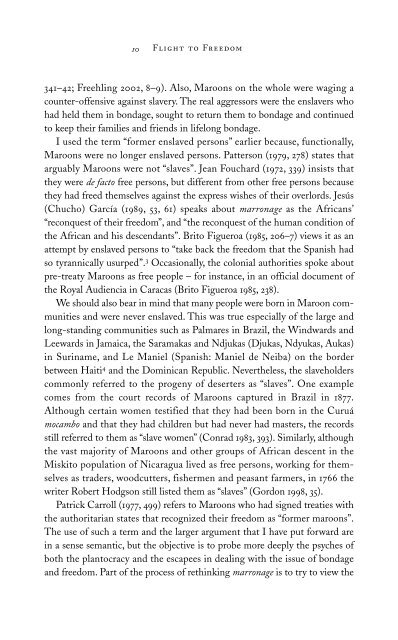60199616-flight-to-freedom-african-runaways-and-maroons-in-the-americas
60199616-flight-to-freedom-african-runaways-and-maroons-in-the-americas
60199616-flight-to-freedom-african-runaways-and-maroons-in-the-americas
You also want an ePaper? Increase the reach of your titles
YUMPU automatically turns print PDFs into web optimized ePapers that Google loves.
10 Flight <strong>to</strong> Freedom<br />
341–42; Freehl<strong>in</strong>g 2002, 8–9). Also, Maroons on <strong>the</strong> whole were wag<strong>in</strong>g a<br />
counter-offensive aga<strong>in</strong>st slavery. The real aggressors were <strong>the</strong> enslavers who<br />
had held <strong>the</strong>m <strong>in</strong> bondage, sought <strong>to</strong> return <strong>the</strong>m <strong>to</strong> bondage <strong>and</strong> cont<strong>in</strong>ued<br />
<strong>to</strong> keep <strong>the</strong>ir families <strong>and</strong> friends <strong>in</strong> lifelong bondage.<br />
I used <strong>the</strong> term “former enslaved persons” earlier because, functionally,<br />
Maroons were no longer enslaved persons. Patterson (1979, 278) states that<br />
arguably Maroons were not “slaves”. Jean Fouchard (1972, 339) <strong>in</strong>sists that<br />
<strong>the</strong>y were de fac<strong>to</strong> free persons, but different from o<strong>the</strong>r free persons because<br />
<strong>the</strong>y had freed <strong>the</strong>mselves aga<strong>in</strong>st <strong>the</strong> express wishes of <strong>the</strong>ir overlords. Jesús<br />
(Chucho) García (1989, 53, 61) speaks about marronage as <strong>the</strong> Africans’<br />
“reconquest of <strong>the</strong>ir <strong>freedom</strong>”, <strong>and</strong> “<strong>the</strong> reconquest of <strong>the</strong> human condition of<br />
<strong>the</strong> African <strong>and</strong> his descendants”. Bri<strong>to</strong> Figueroa (1985, 206–7) views it as an<br />
attempt by enslaved persons <strong>to</strong> “take back <strong>the</strong> <strong>freedom</strong> that <strong>the</strong> Spanish had<br />
so tyrannically usurped”. 3 Occasionally, <strong>the</strong> colonial authorities spoke about<br />
pre-treaty Maroons as free people – for <strong>in</strong>stance, <strong>in</strong> an official document of<br />
<strong>the</strong> Royal Audiencia <strong>in</strong> Caracas (Bri<strong>to</strong> Figueroa 1985, 238).<br />
We should also bear <strong>in</strong> m<strong>in</strong>d that many people were born <strong>in</strong> Maroon communities<br />
<strong>and</strong> were never enslaved. This was true especially of <strong>the</strong> large <strong>and</strong><br />
long-st<strong>and</strong><strong>in</strong>g communities such as Palmares <strong>in</strong> Brazil, <strong>the</strong> W<strong>in</strong>dwards <strong>and</strong><br />
Leewards <strong>in</strong> Jamaica, <strong>the</strong> Saramakas <strong>and</strong> Ndjukas (Djukas, Ndyukas, Aukas)<br />
<strong>in</strong> Sur<strong>in</strong>ame, <strong>and</strong> Le Maniel (Spanish: Maniel de Neiba) on <strong>the</strong> border<br />
between Haiti 4 <strong>and</strong> <strong>the</strong> Dom<strong>in</strong>ican Republic. Never<strong>the</strong>less, <strong>the</strong> slaveholders<br />
commonly referred <strong>to</strong> <strong>the</strong> progeny of deserters as “slaves”. One example<br />
comes from <strong>the</strong> court records of Maroons captured <strong>in</strong> Brazil <strong>in</strong> 1877.<br />
Although certa<strong>in</strong> women testified that <strong>the</strong>y had been born <strong>in</strong> <strong>the</strong> Curuá<br />
mocambo <strong>and</strong> that <strong>the</strong>y had children but had never had masters, <strong>the</strong> records<br />
still referred <strong>to</strong> <strong>the</strong>m as “slave women” (Conrad 1983, 393). Similarly, although<br />
<strong>the</strong> vast majority of Maroons <strong>and</strong> o<strong>the</strong>r groups of African descent <strong>in</strong> <strong>the</strong><br />
Miski<strong>to</strong> population of Nicaragua lived as free persons, work<strong>in</strong>g for <strong>the</strong>mselves<br />
as traders, woodcutters, fishermen <strong>and</strong> peasant farmers, <strong>in</strong> 1766 <strong>the</strong><br />
writer Robert Hodgson still listed <strong>the</strong>m as “slaves” (Gordon 1998, 35).<br />
Patrick Carroll (1977, 499) refers <strong>to</strong> Maroons who had signed treaties with<br />
<strong>the</strong> authoritarian states that recognized <strong>the</strong>ir <strong>freedom</strong> as “former <strong>maroons</strong>”.<br />
The use of such a term <strong>and</strong> <strong>the</strong> larger argument that I have put forward are<br />
<strong>in</strong> a sense semantic, but <strong>the</strong> objective is <strong>to</strong> probe more deeply <strong>the</strong> psyches of<br />
both <strong>the</strong> plan<strong>to</strong>cracy <strong>and</strong> <strong>the</strong> escapees <strong>in</strong> deal<strong>in</strong>g with <strong>the</strong> issue of bondage<br />
<strong>and</strong> <strong>freedom</strong>. Part of <strong>the</strong> process of reth<strong>in</strong>k<strong>in</strong>g marronage is <strong>to</strong> try <strong>to</strong> view <strong>the</strong>


